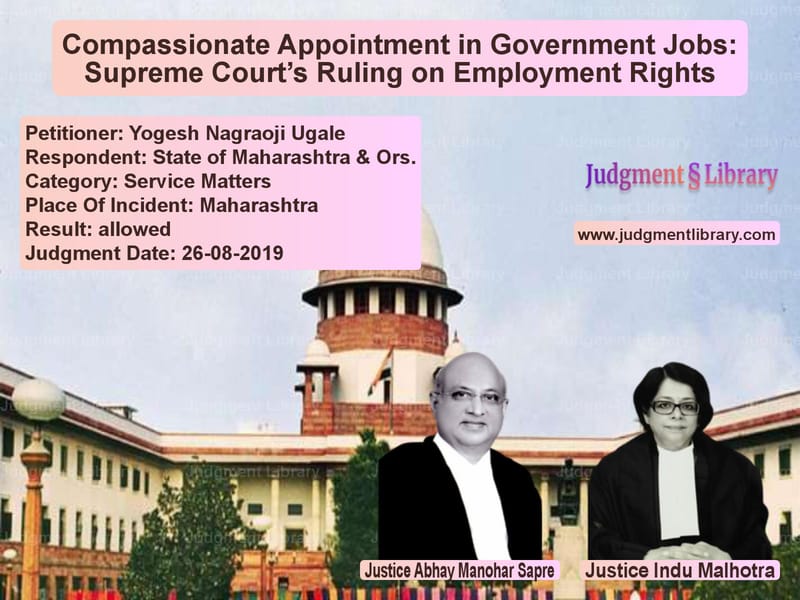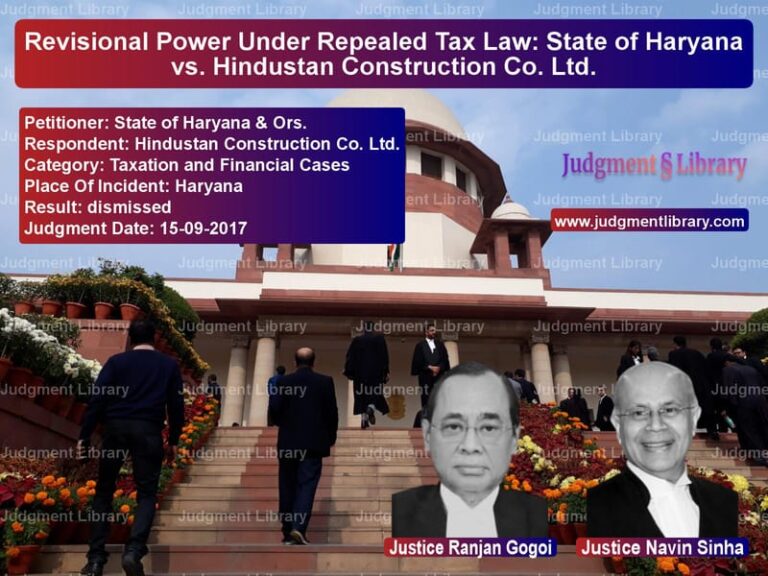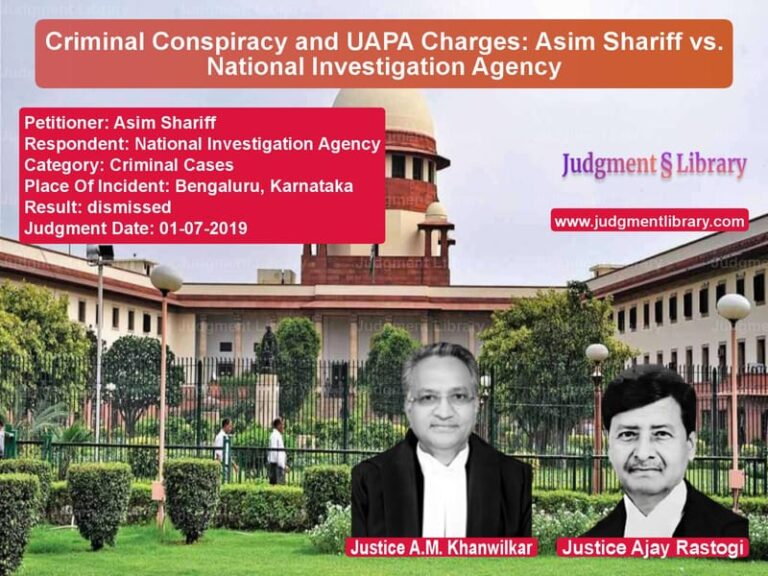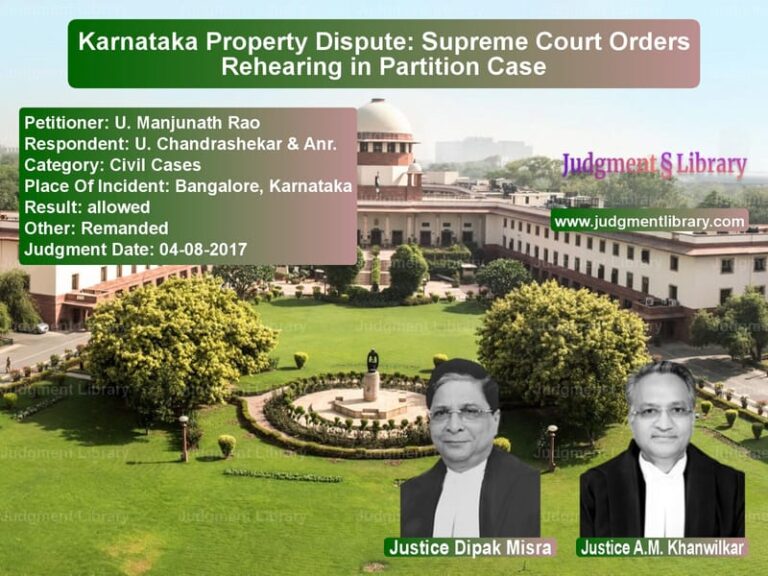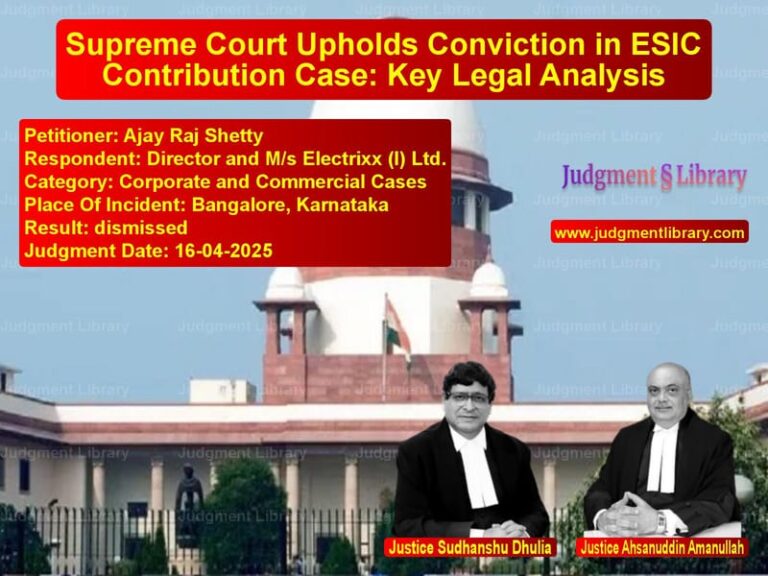Compassionate Appointment in Government Jobs: Supreme Court’s Ruling on Employment Rights
The case of Yogesh Nagraoji Ugale vs. State of Maharashtra & Ors. revolves around the right to compassionate appointment in government-aided institutions. The Supreme Court’s ruling clarifies the eligibility criteria, the impact of government bans on recruitment, and the obligation of institutions to consider such requests fairly.
The central legal issue in this case was whether the appellant, whose father was a Class IV employee in a government-aided school, was entitled to a compassionate appointment despite the state government’s restrictions on new hires.
Background of the Case
The appellant, Yogesh Nagraoji Ugale, is the son of Late Shri Nagraoji Ugale, who worked as a Peon (Class IV) in a school run by the Nagpur Pradesh Education Society. While in service, his father passed away due to a heart attack on October 13, 2012. Since his father was the sole breadwinner of the family, the appellant applied for compassionate appointment on October 29, 2012, followed by further requests on October 30 and October 31, 2012.
The Education Officer (Respondent No. 2) called the appellant for a hearing on May 17, 2013, to consider his request. However, the concerned school authorities (Respondent Nos. 3 and 4) failed to attend the hearing, causing further delays.
Government’s Restrictions on Recruitment
The State of Maharashtra had imposed a ban on recruitment of Group C and Group D employees in government-aided institutions since August 22, 2005, to control administrative expenditures following the 6th Pay Commission recommendations. The ban was partially lifted for candidates in the waiting list before December 31, 2011, but the appellant’s case was filed after this date.
Petitioner’s Arguments (Yogesh Nagraoji Ugale)
The appellant contended that:
- His family was facing severe financial distress due to his father’s sudden demise, making compassionate appointment necessary.
- He was fully qualified for the post of Peon (Class IV), holding an S.S.C. degree and certification in MS-CIT (Computer Skills).
- There were two vacant posts for Junior Clerks in the schools run by the Nagpur Pradesh Education Society, making his appointment feasible.
- The school management had initially agreed to appoint him, subject to the Education Officer’s approval.
- The monetary benefits received by his family (Rs. 7,50,000) from Provident Fund, Gratuity, and Leave Encashment should not be a basis for rejecting his appointment.
Respondents’ Arguments (State of Maharashtra & School Authorities)
The respondents argued that:
- The appellant was not entitled to compassionate appointment because his family had already received substantial financial compensation.
- The 2005 government resolution restricted new recruitment, and only candidates in the waiting list before December 31, 2011, were considered.
- The school did not have permission from the Education Department to fill the vacant posts.
- The appellant could not claim compassionate appointment as a matter of right, and it was subject to availability and administrative discretion.
High Court’s Decision
The Bombay High Court (Nagpur Bench), in its judgment dated November 19, 2014, dismissed the appellant’s petition. It held that:
- The appellant’s family had already received financial compensation of Rs. 7,50,000, and his mother was receiving a monthly pension of Rs. 11,030.
- The government’s recruitment ban on Group C and D employees was valid and applicable in this case.
- Compassionate appointment could not be granted as a legal right but only as a welfare measure subject to policy considerations.
Supreme Court’s Observations
The Supreme Court analyzed the legal principles governing compassionate appointment and made the following key observations:
- The appellant was educationally qualified for the position.
- The Government of Maharashtra had relaxed the recruitment ban on compassionate appointments in March 2014, increasing the limit from 5% to 10% of vacancies.
- The Education Officer had already noted that two vacant posts existed in the school where the appellant could be accommodated.
- The school management had initially agreed to appoint him, subject to approval.
- The High Court had failed to consider these relevant factors while dismissing the petition.
Key Ruling and Verdict
The Supreme Court set aside the High Court’s judgment and ruled in favor of the appellant, directing:
- The school authorities (Respondent Nos. 3 and 4) to submit the proposal for the appellant’s appointment within one month to the Education Officer.
- The Education Officer (Respondent No. 2) to take necessary action and grant approval for the appointment.
- The appointment process to be completed without undue delay.
The Court emphasized:
“The High Court failed to consider the fact that the government itself had relaxed the recruitment ban in 2014, allowing up to 10% of vacancies to be filled through compassionate appointments.”
Implications of the Judgment
This judgment has significant implications for government employees and their families seeking compassionate appointments:
- Relaxation of Recruitment Bans: Government-imposed hiring restrictions should not be used arbitrarily to deny eligible candidates a chance at employment.
- Educational Qualification Matters: If a candidate is qualified and meets all criteria, their application must be considered fairly.
- Financial Assistance Does Not Eliminate Need: Receiving a one-time compensation amount does not automatically disqualify a candidate from seeking employment.
- Administrative Accountability: Schools and government authorities must process compassionate appointment requests promptly and in good faith.
The Supreme Court’s ruling ensures that compassionate appointment policies are applied justly and that government employees’ families receive due consideration in times of hardship.
Petitioner Name: Yogesh Nagraoji Ugale.Respondent Name: State of Maharashtra & Ors..Judgment By: Justice Abhay Manohar Sapre, Justice Indu Malhotra.Place Of Incident: Maharashtra.Judgment Date: 26-08-2019.
Don’t miss out on the full details! Download the complete judgment in PDF format below and gain valuable insights instantly!
Download Judgment: Yogesh Nagraoji Ugal vs State of Maharashtra Supreme Court of India Judgment Dated 26-08-2019.pdf
Direct Downlaod Judgment: Direct downlaod this Judgment
See all petitions in Employment Disputes
See all petitions in Public Sector Employees
See all petitions in Recruitment Policies
See all petitions in Judgment by Abhay Manohar Sapre
See all petitions in Judgment by Indu Malhotra
See all petitions in allowed
See all petitions in supreme court of India judgments August 2019
See all petitions in 2019 judgments
See all posts in Service Matters Category
See all allowed petitions in Service Matters Category
See all Dismissed petitions in Service Matters Category
See all partially allowed petitions in Service Matters Category

